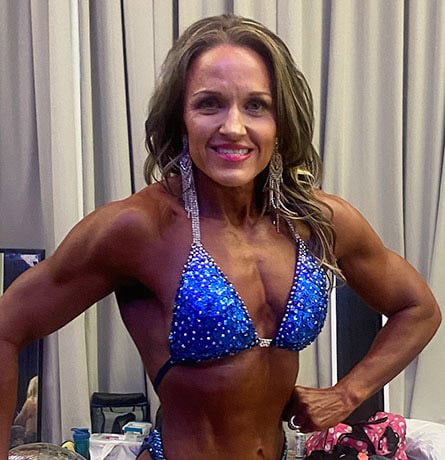Nurse-midwifery encourages patients to tap into their strengths before, during and after childbirth. In a sense, Jessica Anderson, DNP ‘17, CNM, channels that special kind of energy by competing in statewide bodybuilding competitions.
Dr. Anderson is an associate professor and director of Midwifery Services at the University of Colorado College of Nursing. Among her many professional titles, she serves on the American College of Nurse-Midwives Board of Directors and is the board chair of the Colorado Perinatal Care Quality Collaborative, (CPCQC) which works with healthcare providers, community organizations, and families to advance best practices in improving maternal and infant health. Recently, she was accepted to serve on the statewide Maternal Health Task Force, convened by the Maternal Mortality Prevention Program for the Colorado Department of Public Health and Environment and the CPCQC.
“I like to feel like I’m coming from a place of strength and power. There’s a lot of pride and ownership that comes with bodybuilding.” – CU Nursing Associate Professor and Director of Midwifery Services Jessica Anderson, DNP ‘17, CNM
In addition to those impressive credentials, Anderson often ranks highly in Colorado bodybuilding competitions, including those organized by the National Physique Committee. Though she considers bodybuilding an extracurricular activity separate from her “day job,” she acknowledges that bodybuilding helps her feel empowered.
“I like to feel like I’m coming from a place of strength and power,” Anderson says. “There’s a lot of pride and ownership that comes with bodybuilding, and I just like being part of a strong community. I also think it’s about choice and being in control of my body.”
What she gets from bodybuilding

CU Nursing Associate Professor and Director of Midwifery Services Jessica Anderson, DNP |
Anderson’s interest in weightlifting and bodybuilding grew after the birth of her second child in 2015. Her professional career was growing, and she was completing her doctoral program. Unfortunately, the prosperity and success came at the expense of her health.
“I’ve always been an athlete, and I’ve always gone to the gym,” she says. “I even met my husband in the gym. But when I had my last child while earning my DNP, I really had a hard time losing weight because I was just too busy. So, that was kind of the impetus for getting into bodybuilding. It was a rebirth of exercise and health for me.”
Her interest in bodybuilding strengthened during the pandemic when she started participating in competitions.
“It was sort of my COVID project,” she says. “What I like about bodybuilding is that it’s a supportive community that has nothing to do with nursing or midwifery. I am ultimately in control of the experience and journey. It is my inner competition. I like to challenge myself and see where I can get.”
When asked how she balances her concurrent roles as a nurse-midwife, assistant professor, mother, and self-described “gym junkie,” Anderson provides a simple and declarative answer:
“I get up really early – usually at 3:45 a.m. – and go to the gym,” she says.
From Wisconsin to midwifery
As an only child born in a small rural community in Wisconsin, not a lot of people from Anderson’s family graduated from college.
“My parents told me to go to college,” she says. “It seemed that the two options available to me were becoming a teacher or a nurse. And of course, I am both now.”
Anderson earned her bachelor of science in nursing (BSN) from Viterbo University, a small, liberal arts school in La Crosse, Wisc., before obtaining her master of science in nursing (MSN) in nurse-midwifery from Marquette University in Milwaukee, Wisc.
“I was introduced to midwifery in nursing school and really appreciated the support nurse-midwives provided to (expectant) families,” she says. “Then, I took a job in a 22-bed hospital in rural Wisconsin as a labor and delivery nurse, and I felt that peoples’ options were limited. In terms of their birthing experiences. I didn’t know if I could keep doing that for the next 20 years of my career. That’s when I decided to become a nurse-midwife.”
The road to CU Nursing
As one of only about 80 Certified Nurse-Midwives (CNMs) in the entire state of Wisconsin, Anderson worked for an obstetrician for about two years before moving to Colorado.
“I was ready for a change and wanted to work with other midwives and in a state that supported autonomous midwifery practice,” she says. She joined CU Nursing as a clinical instructor in 2005 and was named director of the College’s Center for Midwifery in 2010. The center is an academic clinical enterprise that supports the community and midwifery education program at CU Nursing.
Since relocating 18 years ago, Anderson found Colorado to be among one of the “friendliest” environments for midwifery. There are over 350 CNMs in the state with 10% of all births in Colorado being attended by CNMs, according to the American College of Nurse-Midwives.
“There have been some really amazing midwives that came before us in this state and at CU,” Anderson says. “There’s always been a foundation that really supported the work and the community of midwifery care.”
True to that tradition, students have characterized Anderson’s teaching style as supportive and flexible.
“When I hear that, it makes me really proud,” she says. “School and work are hard, and our students are doing so much more beyond school. I encourage them to reach out early and often.”
In 2018, Anderson was named CU Nursing’s director of Midwifery Services, where she supports the four nurse-midwifery faculty practices across the Front Range.
Earlier this year, the Center for Midwifery model was designated as an Edge Runner by the American Academy of Nursing. Edge Runners are nurse-designed, innovative models of care or interventions with significant demonstrated outcomes to improve health, impact cost and influence policy.
In addition to helping the CU midwifery enterprise become a leader in the nurse-midwifery field, Anderson was invited to continue her current position on the Colorado Maternal Mortality Committee and the American Diabetes Association’s Women’s Health Initiative Scientific Advisory Council. She considers the maternal mortality rate to be one of the nation’s biggest and most important challenges.
“We have a lot of work to do,” Anderson says. “It’s a national problem, but each state has some variation to the causes. We need to implement large-scale, quality-improvement work to make a dent. We’re going to need lots of midwives in different places to combat this issue.”
Hopes for the future
Just as she is committed to bodybuilding on a personal level, Anderson wants to strengthen the field of midwifery and help it continue to grow.
“For me, it’s about creating job opportunities, clinical sites for our students and access in communities where midwifery services aren’t available,” she says. “So for me, it’s about supporting midwives in everything we do. I want to keep creating practices, programs, access, and job opportunities for the profession.”
Though bodybuilding is an interest outside of her career, Anderson’s commitment to self-improvement should inspire students and her midwifery colleagues to push themselves a little harder.
“I see it as a competition with myself,” she says. “Though I am competing with other people, I often ask myself ‘how can I get better this time?’”


